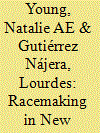| Srl | Item |
| 1 |
ID:
120011


|
|
|
|
|
| Publication |
2013.
|
| Summary/Abstract |
This article explores symbolic boundaries and identity-formation of the 'ethnonational Us', using narrative analysis of eleven Israeli-Jewish dissidents. The hegemonic nationalist discourse in Israel - Zionism - constructs the dissidents' identities as the 'Virtuous Us', yet these individuals genuinely try to connect with the 'Demonized Palestinian Other'. I suggest that the dissidents attempt to use alternative national identity discourses to overcome symbolic boundaries. I highlight inconsistencies within individual dissidents' narratives and attribute them to the employment of multiple discourses, suggesting that some discourses fail to coherently reconcile 'national' history with the well-being of the Other, whilst others repel dissidents by appearing to negate or destroy their identities. The dissidents, therefore, cannot use the available discourses to fully overcome symbolic boundaries. Only the hegemonic nationalist discourse can offer a self-evident and compelling enunciation of the dissidents' political reality, leading one insightful dissident to conclude that there is 'no way out' of his dilemma.
|
|
|
|
|
|
|
|
|
|
|
|
|
|
|
|
| 2 |
ID:
153230


|
|
|
|
|
| Summary/Abstract |
We explore how an ideologically diverse group of white students at Tulane University respond to evidence of racial inequality in post-Katrina New Orleans. In line with prior research, we find commonalities in racialized attitudes and behaviours between students whose racial ideologies otherwise differ. Drawing from anthropological theories of boundary construction and sociological work on colour-blind racism, we argue that the Otherization of non-whites is part of the everyday worldviews and social practices of white Americans. We draw on fieldwork in New Orleans to demonstrate that racist stereotypes and beliefs in racial difference continue to be transmitted within white social spaces. We find that even the most progressive Tulane students are engaged in the construction and reinforcement of symbolic and spatial boundaries between themselves and African Americans. This achieves the purpose for which racial stereotypes were originally constructed – namely, the persistence of racial inequality.
|
|
|
|
|
|
|
|
|
|
|
|
|
|
|
|